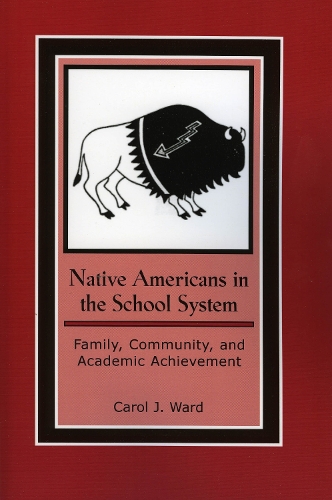
Native Americans in the School System: Family, Community, and Academic Achievement
(Paperback)
Publishing Details
Native Americans in the School System: Family, Community, and Academic Achievement
By (Author) Carol J. Ward
AltaMira Press
AltaMira Press
24th June 2005
United States
Classifications
General
Non Fiction
Indigenous peoples / Indigeneity
373.182997
Physical Properties
Paperback
282
Width 171mm, Height 227mm, Spine 18mm
454g
Description
Carol Ward examines persistent dropout rates among Native American youth, which remain high despite overall increases in Native adult education attainment in the last twenty years. Focusing on the experiences of the Northern Cheyenne nation, she analyses historical, ethnographic, and quantitative data. This volume will be of use to policy makers, instructors of comparative education, Native American studies, sociology and anthropology.
Reviews
Ward's powerful combination of quantitative and ethnographic research methods provides us with rich data sets to help illuminate the complexity of experiences and issues surrounding American Indians and school achievement. Utilizing an ecological theoretical model positions her research at a critical edge in advancing our understanding of the astonishing and disturbing trend of an increase in the dropout rate among American Indian youth. American Indians have the highest dropout rate of any ethnic orcultural group in the United States. Whereas educational statistics are showing a slight improvement in school graduate rates across groups, the statistics on American Indians students have been stubbornly resistant to change. Ward's book links school practices, community beliefs, student achievement, and labor force and economic opportunities in ways that challenge a simplistic view of Indian youth and schooling.. -- Donna Deyhle, University of Utah
In this detailed and thoughtful study of school retention and drop out rates among Northern Cheyenne high school students, Carol Ward has produced a fascinating portrait of schooling within this Native community. The book's breadth reflects the years Ward spent working with Northern Cheyenne educators and community leaders to understand the factors shaping the schooling experience of the students. Ward shows the place of 'native capital' in educational success and uses both quantitative and qualitative data to provide insights into the role of family, community, culture, and the schools themselves in keeping students in school. -- Joane Nagel, University of Kansas
Ward skillfully combines statistical, interview, and ethnographic evidence to produce a nuanced analysis of dropout rates in the Cheyenne Nation. Through insightful examination of their educational contexts she shows the strong positive value of cultural capital for these Native American students. Anyone with a serious interest in the roles of 'family values' in education needs to read this book. -- Thomas D. Hall, Lester M. Jones Professor of Sociology, DePauw University, and editor of A World-Systems Reader
Recommended. * Choice Reviews *
The importance of family and community and the crucial nature of pride or lack of pride that Indian students have in themselvesthese dimensions of schooling have universal application across Indian Country. The issue of racism remains ubiquitous. Ward's research is fresh, her assessments are balanced, and her commentary bears listening to. At Northern Cheyenne, the leadership of the nation and the language and culture programs of Chief Dull Knife College promise to address these crucial educational challenges. For the Cheyenne youth this appears to offer hope for the future. -- Margaret Connell-Szasz, University of New Mexico
Ward's powerful combination of quantitative and ethnographic research methods provides us with rich data sets to help illuminate the complexity of experiences and issues surrounding American Indians and school achievement. Utilizing an ecological theoretical model positions her research at a critical edge in advancing our understanding of the astonishing and disturbing trend of an increase in the dropout rate among American Indian youth.
American Indians have the highest dropout rate of any ethnic or cultural group in the United States. Whereas educational statistics are showing a slight improvement in school graduate rates across groups, the statistics on American Indians students have been stubbornly resistant to change. Ward's book links school practices, community beliefs, student achievement, and labor force and economic opportunities in ways that challenge a simplistic view of Indian youth and schooling.
Author Bio
Carol Ward is Associate Professor in the Department of Sociology at Brigham Young University and was the Director of the Northern Cheyenne Dropout Research Project.
